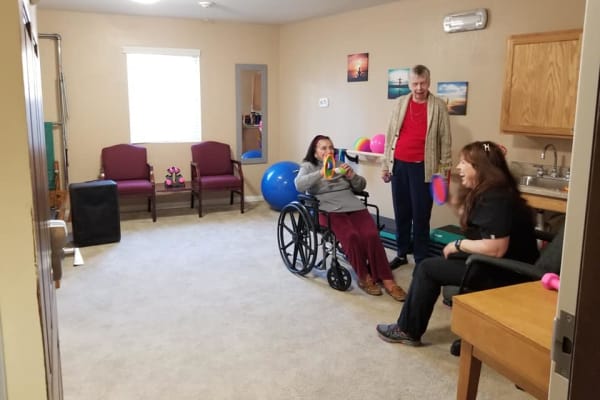Validation Therapy for Treating Dementia
Seniors with Alzheimer’s disease, Vascular Dementia, Lewy Body Dementia or other types of dementia often come to live in an altered reality that doesn’t quite fit with ours. As a senior’s memory loss and cognitive affliction worsen, they may struggle to maintain their sense of time and/or place. The disease process within the brain may even result in hallucinations and/or delusions that may not make any sense to us. However, a dementia patient’s perceptions are quite real to them and can even be frightening at times.
Dealing with this disconnect can be frustrating for family, caregivers, and the seniors themselves, but there are ways of coping. Attempting to understand what is behind a loved one’s feelings and joining them in their world is often the most respectful and gentlest way to handle their beliefs and perceptions that occur dementia.
What is Validation Therapy?
“Validation therapy is a method of therapeutic communication which can be used to connect with someone who has moderate to late-stage dementia. It places more emphasis on the emotional aspect of a conversation and less on the factual content, thereby imparting respect to the person, their feelings and their beliefs.” www.seniorliving.org
Validation Therapy was developed by Naomi Feil, MSW, ACSW in the mid-1980’s. She grew up amongst the elderly as her father was an administrator at a home for the aged, and her mother was the head of the social service department. After school “she became increasingly dissatisfied with the traditional methods used to interact with severely disoriented elders, so she developed a new technique aimed at acknowledging and accepting their irrational perceptions of reality.”
How to Use Validation Therapy for Dementia
Validating a loved one’s perceptions and emotions helps reduce stress, improve communication, boost self-esteem and infuse dignity into dementia care. It increases a sense of happiness for people living with dementia because they aren’t continually being told that they are wrong and confused by truths that they cannot fully understand or remember. This is in stark contrast to the idea of “reality orientation” where the senior is corrected and is tried to be brought into our reality.
Validation Therapy Techniques
There are many techniques associated with Validation Therapy that anyone can use with a loved one with dementia.
-
Reminisce with them - Sitting with your loved one and allowing yourself to be pulled into their memories is often very satisfying. Use pictures or music to transport them to a different time, and reminisce with them about their memories of that time.
-
Eye contact - Eye contact is important in any conversation. It lets the speaker know that what they are saying is valued and important. It creates a bond and sense of understanding.
-
Use music to help - Music has long been known to reduce stress, increase happiness, and have a calming effect. It also helps with reminiscing.
-
Avoid arguing - While Validation isn’t simply agreeing with everything your loved one says, it does mean avoid arguing with them. Their reality is different than ours, and arguing with them can increase their stress and have negative effects on their health and happiness.
-
Mindfulness of tone - Tone is important to distinguish between understanding and support, and condescension. If a senior feels that that their feelings are being ignored, it can allow them to sink into depression and become more withdrawn.
Effectiveness of Validation Therapy
Research into Feil’s Validation Therapy has demonstrated that validation with seniors with dementia increased positive communication, reduced aggressive behavior, and lowered use of harmful psychotropic medications. Additionally, family and caregivers reported feeling more capable of handling difficult situations and experiencing more pleasure in time spent with loved ones and patients.
Final Thoughts
Dementia often leaves the senior in a difficult place. Trapped in a world that they cannot understand, it becomes difficult to communicate and relate with the outside world. Likewise caregivers feel misunderstood and often frustrated in their inability to connect with their loved one. Validation Therapy allows for a bridge between both sides and is proven to work in reducing agitation and increasing communication. One of the Principles of the Validation Method is “listening with empathy builds trust, reduces anxiety and restores dignity”. Shouldn’t this be the goal of our communication?
Dementia Care at Lakeview Terrace
Ridgeline Management Company’s signature program, “Moments” is developed to meet the needs of each of our residents through all stages of dementia. The program will attempt to maintain a safe, secure, and predictable environment that fosters a sense of independence and well-being. It will improve residents’ self-esteem through meaningful activities designed around each person’s interests, talents, and abilities.
At Ridgeline, we train our caregivers to educate them in all stages of dementia (early, middle, and late). Not only will we teach our caregivers how to take care of the residents but also themselves. Because let’s face it, caring for others is hard work.
Our our Memory Care neighborhoods are a place for our residents to receive the support and assistance they need, while feeling as much “at home” as possible. The goal of Moments program is to design an environment for our residents living with dementia to maximize awareness and orientation. We are here to help retain abilities and maintain their independence as long as possible. It is designed to fulfill Ridgeline’s mission: creating an environment where moments of joy, independence, and wellness provided each and every day.
Contact your local Ridgeline community today to learn more!


